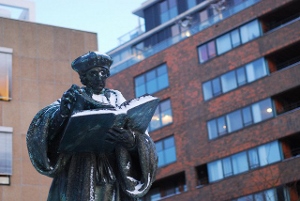Ambition, Greed and the Beginning of the Modern World: An Inquiry into Early-Modern Dutch Political Thought (1566-1733)
Thesis summary
I hold that during the so-called Dutch Golden Age (1585-1672) a number of Dutch thinkers already came up with the idea that egocentric human traits like greed and ambition actually had societal benefits. Thus, Bernard Mandeville's (in)famous proposition that 'private vices' can have 'public benefits' did not come out of thin air, but found it is origins in the works of seventeenth-century Dutch thinkers. If the central idea behind much modern economic and political theories - i.e. that man is a rational human being who will always follow his own self-interest, and hence that the consumer and the voter is always right - can be traced back to economists and philosophers like Adam Smith, John Locke and Thomas Hobbes, this thesis proposes to push the line of inquiry even further back in time and space to the Dutch Golden Age. This should not come as a surprise. In the seventeenth century, the Dutch Republic was the most capitalistic country in the world, where farmers, craftsmen and artists produced for an anonymous market. Its GDP per capita was probably the highest in the world, allowing even humble servants to invest in the Dutch East India Company (VOC) - the first company to issue stock to the public. All these innovations and the wealth they help to create did not necessarily lead to an embarrassment of riches. Instead, they stimulated the Dutch to analyse and explain their own society in both old and new ways, leading to novel ideas about the relationship between state and society.
Thesis structure
- Coornhert: from the old center to the new
- The Grotius' generation: empire good, greed bad (includes an analysis of Caspar Barlaeus' work, which will try to demonstrate that behind much lovely words Barlaeus was a 'traditional' thinker, who put morality above commerce, and moderation and honour above greed and ambition)
- The pre-Mandevillian Moment: a new generation of immigrants in Leiden - Boxhorn and the brothers De la Court - break with the old mould
- The return of morality: Pieter de la Court and Spinoza
- Lowtide?: Dutch political thought in the age of William III
- Eclipse: the final breakthrough - Bernard Mandeville
Date: 25/03/2020. Last modified: 29/11/2023



